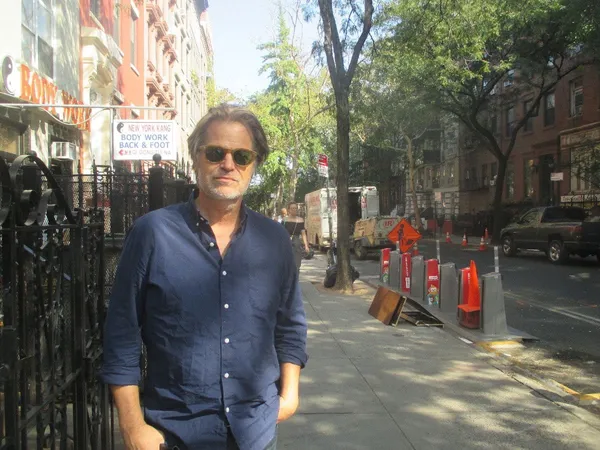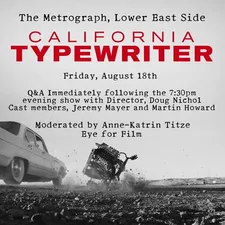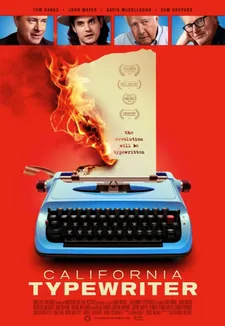 |
| California Typewriter director Doug Nichol on Tom Hanks: "He was great. We spent a day with him, shooting him." Photo: Anne-Katrin Titze |
The afternoon before the theatrical première of California Typewriter in New York, director/writer/cinematographer Doug Nichol met with me for coffee and conversation on his passion project, which hauntingly captures the fleeting nature of time and propels us into the tactile world beyond the screens. Structured around the story of the California Typewriter repair shop in Berkeley, we are taken on an energetic journey with collector Martin Howard, explore the work of sculptor Jeremy Mayer, and experience the reenactment of Ed Ruscha and Mason Williams' Royal Road Test execution.
Sam Shepard, David McCullough, John Mayer, Tom Hanks, and typewriter poet Silvi Alcivar all have their own take on what makes the typewriter the machine of choice for them.
Anne-Katrin Titze: Tell me about the timeline, where and when you got those interviews and how the film evolved.
_225.webp) |
| Sam Shepard at the Santa Fe Institute |
Doug Nichol: Now, maybe six years ago, I bought a typewriter and I wanted to find a place to repair it and I found California Typewriter, met the family and decided to make a three minute short. To help them out. I was going to put it on YouTube or Vimeo - just to show that this family is trying to keep the typewriter shop going in the age of computers. I made it and a friend got it to Tom Hanks. He watched it and said "Oh, I love this. I'll be in the film, if you want." Then I thought it could be more than a short. I filmed Tom. He was great. We spent a day with him, shooting him.
AKT: Where did you shoot him?
DN: In his offices. Playtone in Los Angeles. He is surrounded by his whole collection of typewriters. He is very passionate about the typewriters. He says in the film how he likes to write on them every day.
AKT: It's so obvious. You captured this beautiful moment when Hanks grunts picking up a typewriter, comes in, huffing and puffing, carrying the machine - as if to show you - look, this is important. This has substance and weight.
DN: Exactly. And they're heavy but he loves them and is surrounded by them. So, once I got Tom, I started cutting it and a friend had a connection to David McCullough. So them we filmed McCullough in Martha's Vineyard. The whole film totally grew in an organic way. I never sat down and wrote up a script. One famous person led to another famous person.
_225.webp) |
| Tom Hanks "is very passionate about the typewriters. He says in the film how he likes to write on them every day." Photo: Anne-Katrin Titze |
And then the shop - I started filming them and I met Jeremy Mayer, the sculptor, through them. And he told me about Martin Howard. And then I found out about Ed Ruscha's Royal Road Test. It's a total passion project that I funded myself. I shot it, directed it, edited it. I did most of the sound, colour graded it.
AKT: Sam Shepard, when did you film him? Is that Santa Fe?
DN: Yes, we filmed it at the Santa Fe Institute.
AKT: Where he was writer-in residence with all the scientists.
DN: Yes, right next door to him was Cormac McCarthy. We didn't try to get him because we knew he doesn't appear on films much. He [McCarthy] had his new typewriter there. You know at the beginning of the film we have the auction [at Christie's] of his old one [for 210 thousand dollars]. But then the head of the Santa Fe Institute bought him a new typewriter for 19 dollars and he continues his writing.
AKT: That's great. And when was that interview in Santa Fe?
DN: 2012. Most of the celebrity interviews took place 2012. What took the time to make the film was following the lives of the characters. I followed Jeremy from when he had no money, sleeping on the floor of a shipping container in Oakland, all the way up to people buying his work for hundreds of thousands of dollars. And I had to follow the ups and downs of the shop and Martin as he's trying to find his typewriter. So it took time to follow these stories.
 |
| Metrograph California Typewriter opening night announcement |
AKT: It's a great start to begin with a re-staging of the Ed Ruscha Royal Road Test.
DN: What's great is that next week in Los Angeles we are having a party and Ed Ruscha is coming with Mason Williams. It was 50 years ago when they did that. So it's going to be pretty much on the 50th anniversary of the event. We're going to have a party for the Royal Road Test and for the movie.
AKT: The very first shot, if I am correct, is of geese flying and the moon, rocks and cacti. The beautiful landscape and then the machine. I like how you link images of nature - and driving.
DN: The subtext of the film is about the natural world. We're increasingly moving into a world where we're totally surrounded by everything we make in a digital thing. Jeremy finds a lot of his stuff from the natural world. There's the analog which is natural and then the digital which is where we're all headed.
AKT: The subject of childhood is very prominent in your film, too. Tom Hanks's enthusiasm for the typewriters is quite childlike. You have this great sequence where you show children discovering typewriter magic in the shop while we hear Tom Hanks's voice talking. That's great editing, this combination. When Hanks says - if I could only pick one, or the top five - these are games children would play. You also go into Martin Howard's play-filled childhood. There is a link, a thread of playfulness.
DN: Exactly. Overall, although the film is about typewriters, it's really not about typewriters. For me it's about creativity and how technology changes. It's also about three ways of looking at life. You can either live in the past and connect with your childhood and nostalgia. Or you can live in the future, like Jeremy lives. Or you can live in the present and that's the family trying to keep their shop alive. I really tried to keep those three stories going.
 |
| California Typewriter poster |
And I agree with you, the shop is being saved because children are asking their parents for typewriters. They come into California Typewriter and they play and they borrow a typewriter. Part of that is because the kids grew up touching glass at home. And they go "Wow, this is great, you can actually push a button."
AKT: The beautiful way Sam Shepard puts it, that you can see "the ink flying into the paper."
DN: When people type, the ink is dyed into the paper and will actually last for thousands of years if you keep it out of the sunlight. That's one of the reasons why Tom Hanks likes to write letters - because these letters will last for thousands of years. Whereas everything we are writing now on computers, it's going into a server. We think we have it, but five years from now, they change the operating system. And you never go back to your hard drive.
AKT: Right. John Mayer says that.
DN: There is this thing about permanence, about things lasting.
AKT: And the tactile component, that you have a paper in your hand. There is no screen keeping you from something. Interesting in this context, I found also that somebody brings up spiritualism. The coinciding of the invention of cinema and the typewriter and the flourishing of the spiritualist and symbolist movements with seances in the last decades of the 19th century.
DN: Yeah, that was all in the 1890s. It's true. It's amazing that it's a short period of time when everything was invented at the same time.
Coming up - Doug Nichol on David McCullough and the drawings of the Brooklyn Bridge, John Mayer and a "Blade Runnery back alley deal", typewriter poet Silvi Alcivar, on linking the machine to Tom Hanks and Martin Howard's fathers, the mystery of QWERTY, Mystical Symbolism and the Salon de la Rose + Croix in Paris at the Guggenheim Museum, Paul Auster and the magic in the keyboard, and films having a life of their own.
Following tonight's theatrical premiere at 7:30pm at Metrograph in New York, there will be a discussion and Q&A with the director Doug Nichol, Jeremy Mayer, Martin Howard, and typewriter repairman extraordinaire Ken Alexander, moderated by Anne-Katrin Titze.





















